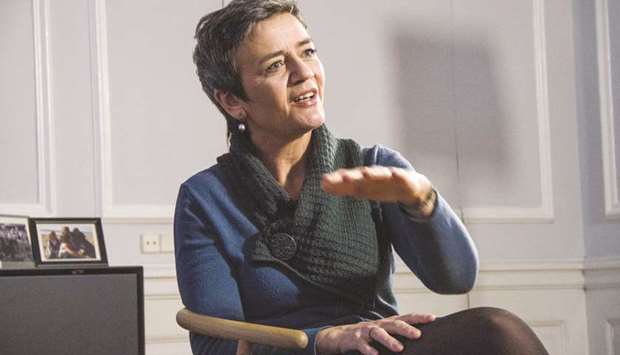The same team is poised to rule on one of the cases against Amazon.com and McDonald’s Corp in the coming weeks, according to three people familiar with the cases who spoke on condition of anonymity.
Competition watchdogs are also weighing a more general crackdown on special tax deals that EU countries offer big Corps.
EU Competition Commissioner Margrethe Vestager oversees the so-called state-aid group, and fresh from levying record antitrust fines on Google, insists she’s not singling out American companies, pointing to European firms that have been penalised. But moving against Amazon and McDonald’s also risks further stoking tensions with the US, which is still sore over the Apple ruling.
“The European Commission is not giving up as it firmly believes in the approach it has taken,” said Howard Liebman, a tax partner at law firm Jones Day in Brussels. Even if the commission’s decisions are overturned, appeals are “very costly and it can result in significant harm in the court of public opinion.”
The EU is targeting unfair tax practices that give a selective advantage to some companies to attract their business and the jobs attached. Its state-aid officials in 2013 embarked on an unprecedented quest to find questionable deals among the thousands of otherwise legal tax pacts governments have arranged for companies for years. Fast forward to 2017, and regulators are nowhere near done.
As the EU seeks to fix loopholes it says allowed the likes of Apple to pay less than their fair share, US President Donald Trump is weighing plans to rein in revenue lost when companies shift profits to tax havens. The proposals would allow US companies to bring back, or repatriate, years’ worth of foreign earnings after paying a low tax rate.
Amazon, McDonald’s and the commission all declined to comment on the status of the EU probes. While a decision on the McDonald’s case has been expected to be the next in line, regulators have wrapped up their fact-finding in both investigations, the people said.
The EU commission “is maybe reaching the end of the beginning of the process, but certainly not the beginning of the end,” Gert-Jan Koopman, the authority’s deputy director-general for state aid, said September 26 at a conference in Brussels. He called the crackdown a “long-term, crucial priority.” Several probes into the individual deals — known as tax rulings — are still open, involving companies including Amazon, McDonald’s and also Engie in Luxembourg. Now, the commission has decided to dig even further and look at tax avoidance more generally.
“We are still looking at a variety of individual cases, but also a number of schemes in member states,” Koopman said. “This remains a very large priority and I would also expect over the next year for there to be a large number of cases.”
Starbucks Corp and a Fiat Chrysler Automobiles unit were first in 2015, ordered to repay as much as €30mn each to the Netherlands and Luxembourg respectively. The following year, 35 companies including Anheuser-Busch InBev had to pay as much €700mn in total back to Belgium.
Appeals have been piling up at the EU courts, and lawyers are awaiting on rulings to establish legal precedents on the use of state-aid law.
“From a legal perspective, they are certainly not bulletproof and their reasoning is bold in some respects,” said Alfonso Lamadrid, an antitrust lawyer at Garrigues in Brussels.
The commission says it is focusing on “outliers,” agreements that are so questionable that they must be pursued. Still, the number of prosecutions means a broad collection of companies are uncertain about their tax affairs, lawyers said.
“The question really is: what is an outlier?” Liebman said. “Every ruling is keyed in to the facts of that specific taxpayer, which means that, arguably, it is selective. That is the big problem, in my view, with the commission’s approach to all this.”
In a boost to the commission, the EU’s top court in December “opened the gates” to a broader range of investigations by showing its willingness “to accept a very broad and arguably unprecedented understanding of selectivity,” Lamadrid said.
The judgment by the Luxembourg-based EU Court of Justice in a Spanish case concerning tax breaks for companies, including Banco Santander, could ultimately add impetus to the region’s clampdown on special tax treatment for selected companies. Because of its precedent-setting nature, it could make it harder for Apple and other companies fighting the commission’s decision against them, the lawyer said.
The ruling “clearly opens the gates for the commission to exercise much more control on fiscal policies of member states,” Lamadrid said.

